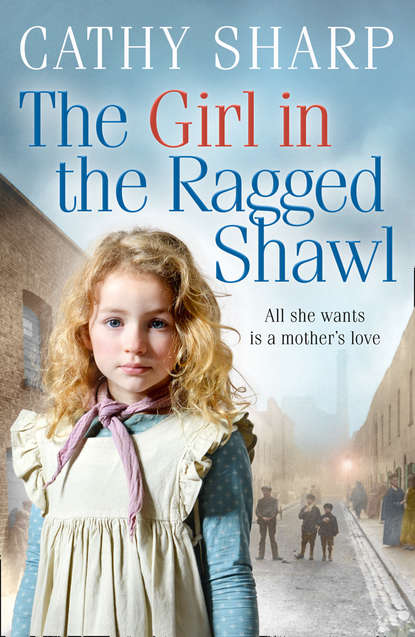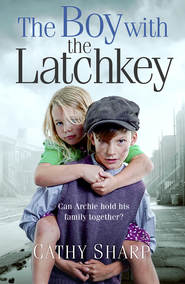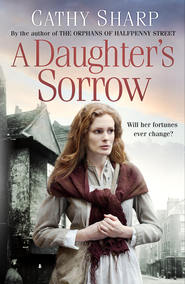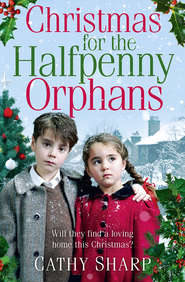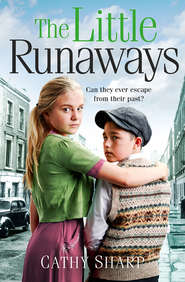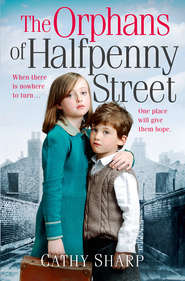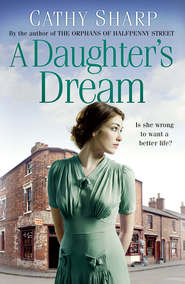По всем вопросам обращайтесь на: info@litportal.ru
(©) 2003-2024.
✖
The Girl in the Ragged Shawl
Автор
Год написания книги
2019
Настройки чтения
Размер шрифта
Высота строк
Поля
Chapter 28
Keep Reading … (#litres_trial_promo)
Don’t miss these other novels by Cathy Sharp, available to buy now
About the Author
Also by Cathy Sharp
About the Publisher
CHAPTER 1 (#uec02cbf0-eff7-50ea-8863-d17798bf3a4e)
Eliza curled into a ball, crossing her arms over her stomach as the ache became a gnawing pain of hunger and she bit her lip to stop herself moaning. It was three days since she’d eaten anything, and she’d drunk only a few sips of water that Ruth had risked a beating to bring her just after she was shut up in here. Since then no one had come near. She was so cold that her fingers felt numb and her teeth were chattering. She believed she might die, locked in this dark cellar because of the mistress’s spite. She’d been beaten and thrown in this terrible place without a blanket or a mattress to lie on, all because she had told Mistress Simpkins that she was a liar.
‘You wicked, evil child!’ the incensed mistress of the workhouse had yelled at her. ‘How dare you say such a thing to me? How dare you speak to your betters in such a tone?’
‘You told us a lie.’ Eliza had stuck to her guns, despite her fear. ‘Tommy Hills died because you beat him for falling over when he was working but he was ill and – and it was your fault, because you withheld his rations,’ she ended defiantly, staring proudly at the woman who ran the female side of the workhouse. Tommy was not in Mistress Simpkins’ ward, but she’d given him the task of clearing a pile of heavy wood intended for repairs to the roof. He’d suffered with a malady of the lungs and he’d been coughing and gasping for breath when he staggered and fell, dropping an armful of the logs in front of the mistress. In a rage, Joan Simpkins had beaten the lad with the cane she carried at all times, striking him across his shoulders and arms until he’d collapsed into a heap on the ground at her feet.
Eliza had tried to help him and so had Ruth, but they’d been told to go about their business and the mistress had had one of the men carry him to the infirmary, where he’d died in the night. An infection of the lungs, so the mistress had told them, but the inmates all knew who was to blame. Only Eliza was foolish enough to say it out loud and now she was being punished for her audacity.
‘You are both disorderly and refractory,’ Mistress Simpkins said in a cold voice, ‘and you know the punishment for breaking the rules, girl. You will be put on short rations and removed to a place of solitude until you are suitably penitent.’
Eliza had stared at her defiantly, refusing to be cowed by the woman’s cruel threats and for that she received several hard blows across her face. She had been seized by the arm and dragged into the dismal punishment room and there she had been stripped by other women and forced to wear the filthy garb of one judged disorderly, after which she had been brought here to this dark place and thrust into it.
‘You are disobedient, a wicked evil girl,’ the mistress had told her. ‘It would serve you right if I just left you there and forgot you.’
She couldn’t do that! Ruth had told Eliza that the harsh rules of the workhouse allowed for the punishment she’d just been given, but surely the mistress could not leave her here to die? Yet Mistress Simpkins was a law unto herself. It was lawful for her to hire the inmates out for work because she was allowed to recover the costs of keeping them in the workhouse from any employer – and sometimes she charged far more than she was owed, which made it impossible for many to leave in order to take up work unless the employer was willing to pay. Ruth had told her that it was mostly men who came to the workhouse, wanting workers they could beat and work almost to death.
‘An honest employer can take a child or a young woman from a poor family and treat that person fairly,’ Ruth had told her. ‘But a man who means to work his servant to the bone, giving them poor food and expecting them to work all hours, comes here where no questions are asked. If a child or a woman dies after being beaten, who will bother about them if they are from the workhouse? An honest father might inquire after his daughter if she died suddenly – but who will ask for you or me?’
Eliza had shaken her head, because she had no answer. The only person who cared for her was Ruth. In the workhouse there were several other children who had no one, but some remembered their parents, many of whom had died of fevers or starvation, for there was little help for the destitute anywhere. Eliza, however, had been brought here as a babe and knew no one but Ruth and the other inmates. Ruth said it could be worse on the streets, though Eliza could not credit it. For some reason the mistress had taken against her and the other orphans stayed clear of Eliza lest her wrath fall on them.
Even those children who had a mother and father seldom saw them. Families were segregated, the men separated from their wives and children, and the women were not allowed to see their children, except at the discretion of the master or mistress on Sundays when they attended the church. It was forbidden to speak to your husband or wife except during the permitted times and breaking that rule could lead to severe punishment.
Some workhouses had their own chapel, but the roof of the chapel here had fallen in during a storm last winter and as yet sufficient money had not been found to repair it and so the favoured inmates were allowed to walk to church at the end of the road on a Sunday morning. On their return, the families were allowed time together until after the evening meal, when they were once again locked into their separate wings. All the inmates should have been permitted access to a place of worship, but if they chose, the mistress or master could withhold the privilege, and they did – as with schooling, which was meant to be provided for the children. Here there was no resident schoolmaster and lessons were given by the rector, who came three mornings a week, but children were sometimes prevented from attending as a form of punishment. Eliza was more often than not put to work in the laundry when she should have been at her lessons.
‘You have no need of learning,’ Mistress Simpkins had told her more than once. ‘A wicked girl like you deserves no such privilege.’
The lessons provided did not include reading or writing, and for the girls were more likely to be sewing, spinning and weaving, and for the boys, carpentry, masonry, or anything that would be useful in the kind of work they would be expected to do in their future lives. The rector told them beautiful stories of the Christ Child and sometimes he would write things on a blackboard with chalk, explaining that the squiggles he made were writing and that the stories he told them were all written in a book. Eliza was curious about the letters and had asked what they meant, but he’d looked at her sadly and shaken his head, because only a few of the boys were ever given a chance to learn those letters. Eliza had been taught to mend and to weave a little, but she’d hoped that one day she might be taught what the symbols meant inside the book he called the Bible and resented that she was refused that knowledge. The most she’d been taught were the letters of her name so that she could sign the register, though many inmates simply made their mark.
Eliza’s rebellion had built in recent weeks, but left here alone, she was afraid that she might never see Ruth again. Ruth had taken her precious shawl, because Eliza feared the mistress would snatch it and she would never see it again. It had once been a beautiful thing, made of soft ivory wool and edged with satin ribbon and lace but the lace had frayed long ago, because Eliza kept it with her always, even when she was in her bed. It was her only link with the past; Ruth had told her that she had been brought into the workhouse, wrapped in that shawl, and ragged as it was, she could do with it around her shoulders now, even though she knew the mistress would have taken it from her when she was stripped.
It was so cold lying on the stone floor, and very dark in the cellar beneath the workhouse. A tiny chink of light came from an iron grating above her head, but it wasn’t enough to show her more than the shapes of wooden crates and old, broken furniture that had been stored in here. Eliza had tried to find something to sit or rest on, but there were only bits of chairs and broken chests that would one day be used as firewood. Rats scuttled in and out of the rubbish, and one had run over her feet, making her scream, but she was no longer afraid of them: she was too numbed by hunger and cold to feel fear.
Eliza rubbed at her face, but she wasn’t crying. Tears only made you weak and they didn’t help; she’d learned that long ago. Her first memories were of Ruth talking to her and feeding her bread and milk slops sweetened with a little honey that her dearest friend had got from somewhere. She knew that it was a miracle she’d survived in this terrible place for all of her twelve years, for she’d been brought into the workhouse as a baby of a few weeks and in a few more weeks she would be thirteen. Ruth had told her the story so many times.
‘You be the child of a fine lady, my Eliza,’ she’d whispered as they sat huddled together on cold nights, trying to instil warmth into each other, for there were never any fires in the dormitories in which the inmates slept. Only in the kitchen was there a good fire to be found and that was used to fuel the big black iron range that Cook used to heat their food. ‘That shawl be of the finest wool and lace. The mistress didn’t notice, for you be wrapped in a coarse blanket and the shawl be beneath it. She give you to me to care for because she did not want to be bothered with a child that never stopped cryin’ and I hid the shawl until you be older for had she seen it she would’ve taken it.’
‘It belongs to me,’ Eliza said and clutched the shawl to her. There was no fear Mistress Simpkins would sell it now, for it was worn thin and the lace almost gone, but she might still have taken it from spite.
‘Aye, but if she’d seen it then she would have taken it and I doubt not she’d have sold it,’ Ruth said and touched her hand when she saw Eliza’s anger. ‘She would sell the clothes off her back if it wouldn’t shame her to go naked. But she don’t know all …’ Ruth touched the side of her nose. ‘Ruth be up to her tricks and mistress don’t know all.’
‘What do you mean, Ruth?’ Eliza asked.
‘I did find somethin’, my lovely,’ Ruth said, ‘and I hid it away where none shall find it – for ’tis yours, Eliza, and one day you shall have it, but not till we be safe away from here, for she would have it off you if she spied it.’
‘What is it?’ Eliza was curious, but Ruth only shook her head and told her she must wait. Eliza sometimes wondered if Ruth had just made it up to amuse her and take her mind from the hunger and cold, because even when Eliza wasn’t punished by being sent to bed without supper she was always hungry.
Despite the rules that said inmates should be properly fed, Eliza and most of the women could not remember being given sufficient food, unless an important visitor was due. Thin soup of some kind was provided in the middle of the day and sometimes they were given a sliver of cheese at night, but a bowl of porridge or gruel and a small piece of bread twice a day was hardly enough to keep her strength up for the tasks she was made to perform. Only on Sunday, which was a rest day, did the women and children sup on a watery stew with more vegetables than meat, or when the Board of Governors paid a visit, though the men were given stew most days because they needed meat and could not work unless they were fed properly. Their work might be anything from chopping wood or repairing the building, to breaking stones into small pieces, or picking oakum, which was used to help repair the holds of ships, though, of late, the master had acquired good work for the stronger men making rope. The women, though, were mostly given domestic chores, scrubbing, washing and sorting rags that brought in a few pennies for their mistress. They washed and ironed the clothes for the inmates; some of the more skilled women did weaving or spinning, and one woman did the most beautiful sewing, which earned money for the mistress, but some were just too sick to work much and they were either lying in beds in the infirmary wing until they died or sitting hunched up wherever they could find shelter from the cold.
Mistress Simpkins seemed to pick on Eliza more often than anyone else. She was made to scrub floors and empty the slops from the women’s dormitories every morning, and any dirty or unpleasant job that needed to be done was given to Eliza. Sometimes, she wondered why the mistress hated her, but Ruth told her to keep her head down and do whatever she was told.
‘I’ve been sold twice to different masters; they call it hiring but selling is what it is,’ she’d told Eliza. ‘The first one beat me and starved me and then he died and his wife sent me back here; the second one fed me, but he wanted more than a servant and I didn’t like the stink of him so I ran away. I lived on the streets for a few weeks but then I was caught beggin’ and the beak sent me back here to the spike; since then no one has asked for me.’
‘Why do you not leave?’ Eliza asked innocently. ‘Could you not ask to be signed out, as the men do?’ It was easy enough to give the three hours’ notice, which was necessary for the lengthy forms that had to be signed, but to leave without permission was deemed a crime, and if you wore the clothes provided for you by the workhouse it was theft, for they belonged to the master and must be paid for.
‘A man may take his family out if he has work to go to, and in the spring and summer there be work aplenty for those with a strong back,’ Ruth said, ‘but for a woman ’tis not easy to find work unless it be offered afore she leaves, and the fine ladies think twice of taking a servant from the workhouse, for they think us be lazy good-for-nothings. I be not beautiful, my lovely. Not many men look twice at me, and since you came I’ve been content to bide my time here – but they will look at you when you’re older. We must get away from here before that happens, Eliza. Mistress might have sold you afore this if she be willin’ but she refused – and I worry what she plans to do with you, my lovely.’
‘What do you mean?’ Eliza had asked, but Ruth would only shake her head and mutter something she could not understand but knew concerned her friend.
Eliza closed her eyes. How long had she been in this cellar? Far longer than the rules allowed, she was sure. Her fingers and toes were turning numb with the cold. Her eyelids were feeling heavy and she was so tired. Surely, she should have been released before this? She felt as if she were drifting away, being dragged down in the dark cold waters of a deep cavern and it was almost too much trouble to breathe. Perhaps she was dying – and surely death must be easier than living with this pain …
‘Eliza! Oh, be you not dead, my lovely.’ Ruth’s voice seemed to come from a long way off. ‘I swear that I will kill that evil witch if you be dead, my sweet babe, for as innocent as a babe you are and she a hell-born monster.’
Eliza’s mouth felt so dry and she tried to moisten her lips and ask for water but the words wouldn’t come. She felt Ruth’s rough-skinned but gentle hands stroking her forehead and her eyelids flickered. Her lips moved as she tried to speak but failed.
‘Sip a little of this, my lovely,’ Ruth said, and Eliza felt the sweetness of cool water on her lips and in her mouth. A trickle went down her throat and she made a little choking noise. ‘She ’ad no right to keep you shut up there that long. Now sip this for me …’
‘Not too much,’ a man’s voice said, and Eliza thought she knew it but she couldn’t be sure. Surely the master wouldn’t be here in the women’s side. He never bothered with the women and children, leaving all that to his sister. ‘I thank you for coming to me, Miss Jones. I cannot afford to have another child die so soon. Mr Stoneham is still demanding answers about the lad who—’
‘Eliza was punished for speaking out, sir. She believed it was because the mistress beat Tommy that he died.’
‘Well, well, no more is to be said of that, do you hear? My sister is a good warden and I won’t hear her slandered – but she should not have left the girl for so long in the cellar. One day shut up is the rule and two on short rations. I fear that she might have died had you not begged me to save her – and I have done so. You must be grateful to me and not speak ill of my sister to the doctor when he comes. The girl hid in the cellar and the door slammed on her. We have been looking for her – do you understand me?’
‘Yes, sir,’ Ruth agreed eagerly. ‘May I heat some milk and honey for her, sir – and then some nourishing broth?’
‘Yes, yes, tell Cook to give you whatever necessary, but in return you will give the story I have prepared – do you agree?’
‘Yes, sir, I do. Thank you for what you did, sir.’
‘Well, well, I am not a bad man,’ Master Simpkins said and cleared his throat. ‘My wife was an angel and she ministered to those in her charge – as you will recall, Ruth. You were but a child when she took ill of a fever and died. Was she not an angel?’
‘Yes, sir, ’tis so. The late mistress was a good woman and I do wish she was still with us.’
‘Well, well, it is what we all wish. My sister is not the woman my wife was – but she does her duty by you all. Now, I have work to do. Remember, if you are questioned by the doctor – or Mr Arthur Stoneham, in particular – you must tell them that the girl ran away and locked herself in the cellar. You do understand me?’
‘Yes, sir, I understand, and thank you for helping me.’





